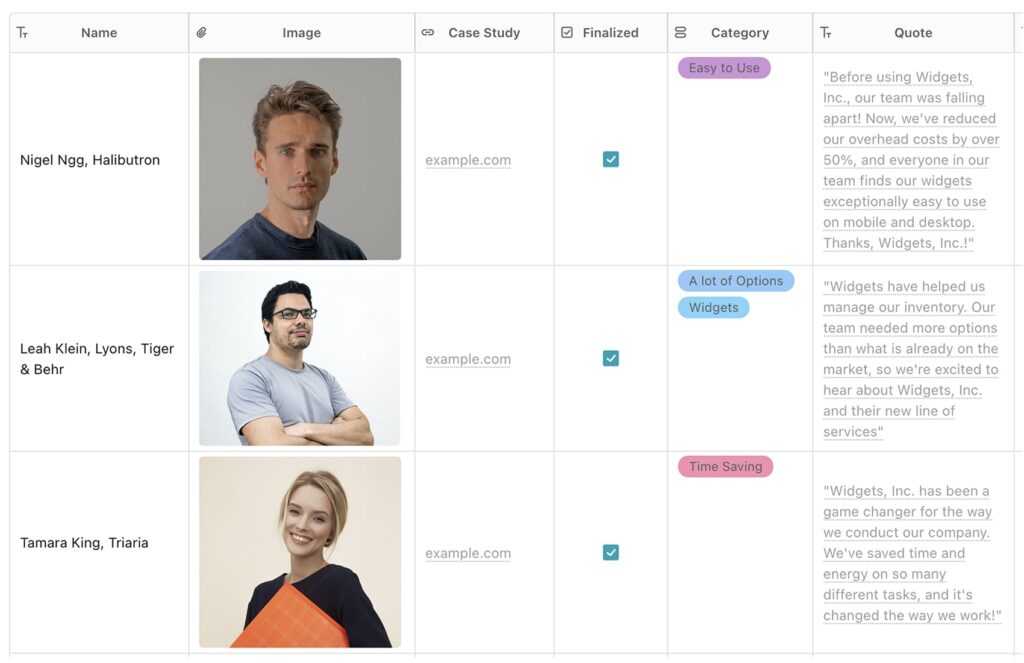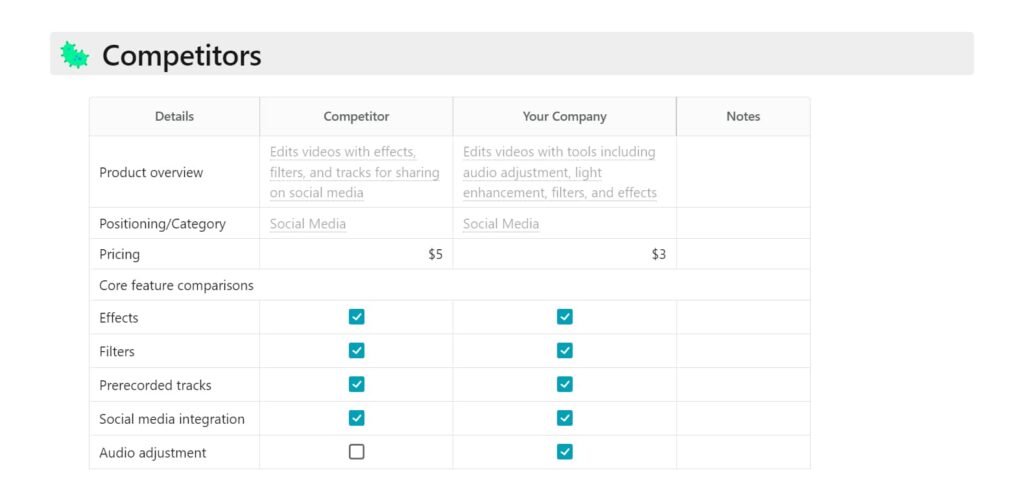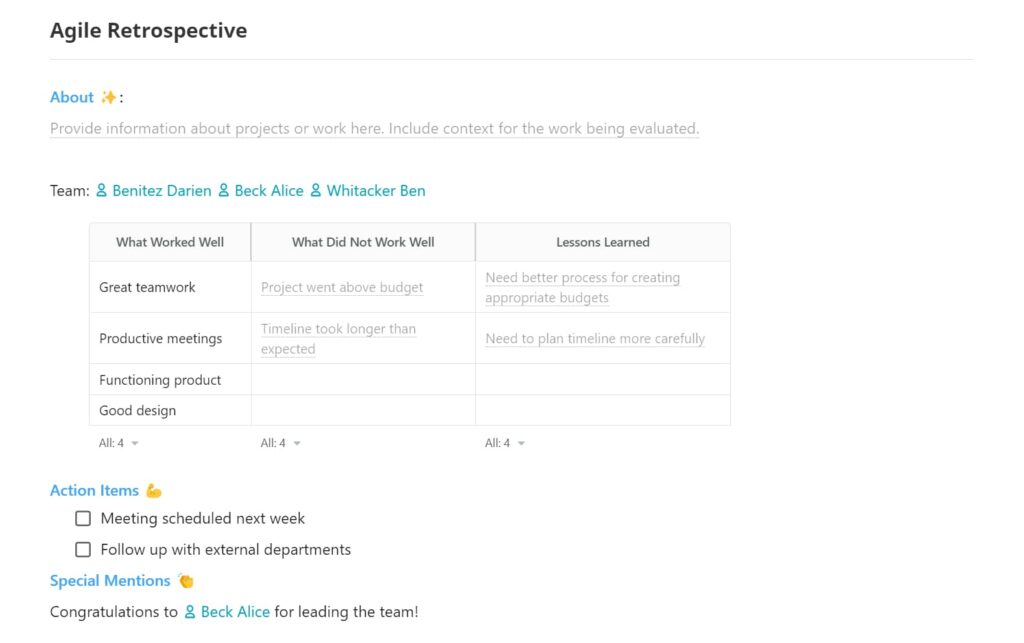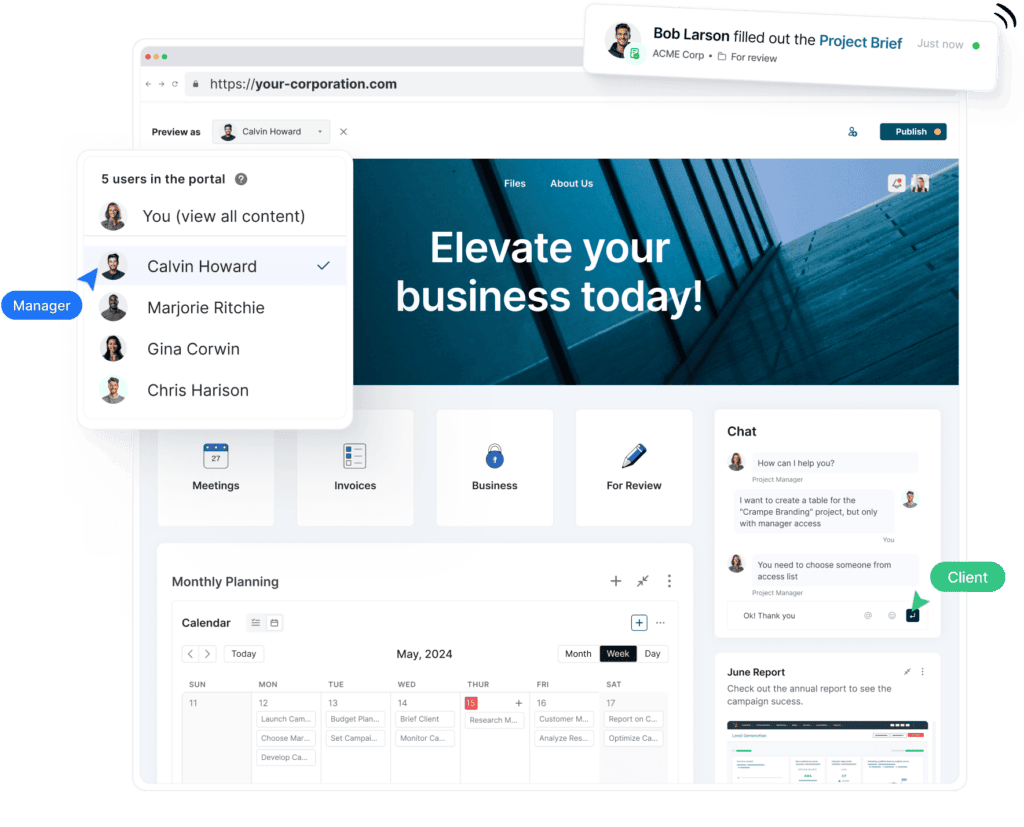
14 Top Client Collaboration Software (Tested and Reviewed in 2025)
- 10 Min read
Trust doesn’t come immediately. It takes time and effort to build reliable, trustworthy relationships, whether it’s with your friends, team partners or clients. Still, trust is essential for any relationship. In a business context, it’s crucial to create an open, friendly, and transparent work environment where all participants feel confident and can count on each other. Trust is one of the most effective ways to boost your team’s productivity, retain customers and drive sales.
However, according to HubSpot research, more than half of clients have stopped supporting brands they used to trust. Some say that’s because modern companies are losing their human attitude, exchanging it for automation.
So what should you do to not fail your clients? What are the two core types of trust? And how do you approach building trust in your business? Keep reading to find the answers!
Before diving deeper into the topic, let’s define what we mean by trust. Although the answer may seem obvious, let’s be honest: every person may understand trust in their own way.
So what is the definition of trust?
According to the Merriam-Webster dictionary, trust is reliance on somebody’s character, strength, abilities or truth. In other words, it’s a sense of firm belief that helps build a confident, strong connection. Building trust is the key to reliable partnerships.
As for the business context, trust is an equally important principle of productive and fruitful cooperation. Harvard Business Review reports that people at companies with a high level of trust experience 74% less stress, 106% more energy at work, 50% more productivity, 76% more engagement and 40% less burnout.
Finally, building trust is one of the essentials in client relationships. People appreciate companies that adhere to their values, provide high quality customer service and don’t neglect emotions. Therefore, a business should strive to build trust and achieve a transparent, friendly relationship with customers. Otherwise, all your marketing and sales efforts may lose their relevance.

In its essence, trust is a broad concept that may be explained and interpreted in many different ways. However, there are more accurate approaches to building trust with your customers.
In fact, according to Graziadio Business Review, customer loyalty strongly depends on two common types of trust: emotional trust and rational trust. Moreover, each of these trust types critically impacts your collaboration with clients. Thus, it’s a good idea to work on both of them in your workplace simultaneously.
Let’s explain these two major types of trust in more detail.
Rational or practical trust is based on factors you can assess, prove and develop. Usually, that’s what we recall when thinking of trust in a business context. Unlike trust types based on feelings, this type involves the company’s practical knowledge, experience, skills, security guarantees, competence and credibility. Building trust this way is one of the common goals of any organization or business working on its image and reputation.
Rational trust often relates to the company’s purpose and corresponds to the level of its values, principles and high customer service standards. A study shows that 94% of customers are willing to opt for businesses with a strong purpose they trust.
It’s also worth noting that a business should make every effort when building trust of this kind. Many factors may affect rational trust. Here are the common ones:
Emotional trust depends on how people perceive your brand, service, or relationship with you at a nonrational level. In particular, it depends on empathy, friendliness, a sense of security and care. This type of trust is much harder to measure and develop as it requires a high level of emotional intelligence and an honest, human-centered approach to cooperation.
A company that prioritizes profits and doesn’t care about people’s feelings may simply fail at building trust with its customers. However, such an approach may critically impact your business’s success. According to a recent study, more than 70% of customers are ready to pay even higher prices for the service of a company they trust.
The reason is that many clients’ decisions are not entirely rational. Often, a person makes impulsive choices based on their feelings. And in such cases, the role of emotional trust is critical.
Both types of trust play a vital role in a business-client relationships. So it’s worth paying extra attention to cultivating care, transparency and high quality customer service within your company.
But how exactly can your company’s trustworthiness help you grow your business? And what are the most significant long-term benefits of prioritizing trust at your workplace? Let’s look at those core advantages in more detail.
How will you expand your audience and attract more clients if they don’t trust your brand? Without feeling confident in your company, people won’t invest their money in your services. Instead, they will prefer your competitors who may have a better reputation and more convincing reviews.
On the contrary, friendly and well-established service pays off. Almost 90% of people are ready to return for a service that has made an excellent first impression. Thus, clients’ trust is not a short term effect but a long-term benefit for your company.
Based on the above, a company that has established different types of trust makes customers happier. Marketing specialists and business analysts should pay special attention to the received feedback. If your customers start believing your brand is trustworthy, you need to understand what they appreciate. Then, you can use this information for further trust development.

Regardless of which industry your business represents, the competition is getting stiffer. And it’s not easy to keep a competitive edge. Here, customers’ trust may become one of the most crucial success factors. If your audience finds your services reliable and distinctive, it will be easier for you to attract and retain customers. Why? Because even with multiple options available, people tend to opt for the services they trust.
Finally, remember that trust is one of your company’s reputation pillars. A good brand image involves more chances that word of mouth will work for you. Good feedback spreads quickly and attracts more attention to your service. So how can it possibly affect your revenues? According to statistics, customers are likely to spend 31% more on a business with excellent reviews.
Building trust is essential for many business aspects, from improving your workplace environment to collaborating with clients. However, it’s not easy to achieve trust. Your manager, customer service team and other coworkers should be taught to build such relationships. Thus, you should do your best to cultivate the essential principles and values, leading to a high level of trust between you and your customers.
EXPERTS SAY:
From beginning to end, when I work with clients, I want them to have a clear understanding of what they can expect from me and when. Through this, I’m able to ensure that I meet or exceed my clients’ expectations while maintaining solid boundaries that protect my time, labor, and resources.
Amelia Ferries
Owner and Content Marketing Consultant at Valkyrie Marketing
Let’s talk about the most productive ways to build trust with your clients and learn how to cultivate those principles in your workplace.
Reliability is one of the core reasons for your customers’ trust. It means they can count on you and believe you will meet their expectations. But how to prove you are a reliable partner?
Start with improving soft skills and time management. Show your client that you respect their opinions, can manage challenging situations and deserve their trust. A project manager and team members should approach every task thoughtfully and accurately.
Also, do your best to respond to all clients’ questions and carefully consult them on everything they want to know. Such an approach will prove your professionalism and encourage clients to trust you.
Another critical pillar of trust is transparency. Ensure your clients know you don’t hide anything by providing open communication. It’s crucial to start trustworthy cooperation from the beginning and keep it up until the end of the project.
At the initial meeting, show you’re ready to share your insights and ask about the person’s expectations. Get your coworkers and customers on the same page to establish mutual trust.
Here are several vital steps to build trust and transparency in your company:
If you don’t show respect to your clients, they will never trust your business. So it’s worth keeping your promises and learning to do things on time. Try not to be late for meetings and adhere to your agreed-upon deadlines. For that, establish good time management in your workplace and encourage every person to care about customers’ expectations.
Read more about the impact of effective time management in our recent blog post.
Also, a project manager can help you enhance trust in your company. Such a professional will deal with organizing work processes and communicating deliverables to the client. Without a project manager, many efforts may fail when building trust.
One of the essential steps to build trust in your team is the ability to admit wrong choices and mistakes. Being honest is the best way to keep trustworthy collaboration with clients and coworkers.

Besides, mistakes are natural. They make us human. So instead of hiding your faults, share it and try to fix things together. Your honesty can establish better contact between you and your clients. Thus, it allows for building trust instead of ruining it.
Well established communication is one of the most direct ways to build trust and mutual understanding. And in contrast, miscommunication is one of the most significant obstacles. So one of your core objectives is to start an open, trustworthy and fruitful collaboration with clients during your meetings and work calls.
Here are a few handy tips to start communication that builds trust.
Remember how crucial emotional trust can be? Clients often perceive business relationships through their feelings and expect an empathic attitude. They appreciate services that care for their needs and consider their pain points. Thus, learning and implementing emotional intelligence principles is vital for earning trust.
In this regard, your customer service workers and other workplace members should be taught to build trust and establish a strong connection with customers. Learning empathy and putting yourself in another person’s shoes are some of the best practices that make people trust you.
In today’s world, many modern businesses have switched to automation. But you have to remember one important thing. What primarily contributes to trusting and loyal relationships is human communication. No matter how well automation saves time, it is your customers’ trust that you should save in the first place.
Every client has a different personality and different needs. You have to create a personalized approach to meet their expectations and establish trust. This can range from developing a unique design for the client to simply scheduling a meeting at a convenient time for the client.
Therefore, clients will know that you care about them. In this way, you can build and maintain a strong relationship not only through rational trust but also through emotional trust.
But there are limits to everything, so remember that the level of personalization for the client shouldn’t overstep your boundaries, because, as we said, a great trusting relationship is about partnership.
Last but not least, remember that work and business relations are still relations between humans. Therefore, a high level of trust is only possible when you treat your client as a partner and vice versa. Mutual understanding, productive communication and respect should encourage you to work as a team, share experiences and look for compromises if anything goes wrong.
Learn more tips about effective collaboration with clients in our blog post.

If you’re looking for robust software to establish efficient collaboration with clients and build trust within your team, FuseBase is an excellent choice. Our tool provides multiple helpful features for enhancing task management, improving communication and building a trustworthy work environment.
How? Let us introduce a couple of our platform’s capabilities.
FuseBase is an excellent choice for businesses striving to build trust and transparency when you work with clients. It allows sharing experiences, enhancing project management and creating an open, accessible work environment.
Does building trust seem like a challenging goal to achieve? Try FuseBase for free! Our tool is easy to understand for clients and feature-rich for your business needs.
Found it useful? Share the article with your community
Get weekly tips and insights on how to grow your business